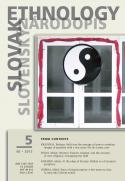WESTERN ‘EASTERN WISDOM’ AND THE CONCEPT OF NEW RELIGIONS: REMAPPING THE FIELD
WESTERN ‘EASTERN WISDOM’ AND THE CONCEPT OF NEW RELIGIONS: REMAPPING THE FIELD
Author(s): Milan FujdaSubject(s): Anthropology
Published by: Ústav etnológie a sociálnej antropológie Slovenskej akadémie vied
Keywords: new religious movements; Hinduism; occultism; communication; printed media; Czech
Summary/Abstract: Terms ‘new religions’ or ‘new religious movements’ refer usually to 1950s or 1960s as the time of the origin of particular religious groups/movements. Yet to set up a date is something else than to clarify why the date is important. The debate concerning NRMs is, however, either surprisingly silent on this issue or inconsistent in subsuming particular cases under this heading. Sociologists and scholars of religion seem to do, in this field, little more than balancing the anti-cultist discourse with minor terminological differences creating an impression of value neutrality. In the following article I will examine the concept of ‘new religions’ on the background of an introduction of communication through the printed media. Using data from my research on acculturation of Hinduism in Czech occultism during the turn of the 19th and 20th centuries, I will point out that this factor played a significant role in modernization of religions in general – ‘new’ as well as ‘old’ –and that after contrasting new religiosity with traditional religiosity while dwelling on a more conservative understanding of the ‘traditional’, the difference between ‘new’ and ‘old’ religions will largely vanish while new possibilities of understanding more important distinctions in the field of religion in modern societies might emerge.
Journal: Slovenský národopis
- Issue Year: 60/2012
- Issue No: 5
- Page Range: 513-538
- Page Count: 26
- Language: English

